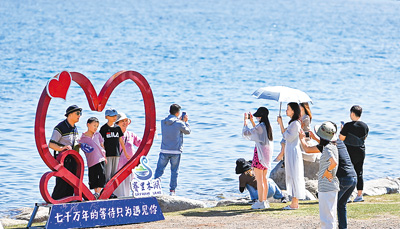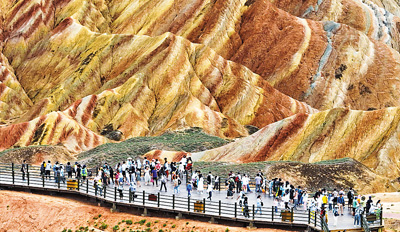China's tourism sees accelerated recovery in H1
China's tourism industry saw accelerated recovery in the first half of 2023, according to a report recently released by the China Tourism Academy (CTA).
Since the beginning of this year, Chinese people's desire to travel has gradually increased and their tourism consumption has continuously expanded.

A British tourist (R) learns Kunqu Opera in Suzhou city, east China's Jiangsu Province. [People's Daily Online/Wang Jiankang]
China saw a total of 2.384 billion domestic tourist trips in the first six months of this year, a year-on-year increase of 63.9 percent, the latest data from the country's Ministry of Culture and Tourism (MCT) showed. During the period, domestic tourism revenue reached 2.3 trillion yuan (about $320.2 billion), up 95.9 percent compared with the same period last year.
A total of 5.5 billion domestic tourist trips are expected to be made in China during 2023, rebounding to more than 90 percent of pre-pandemic levels, the report said. The revenue generated by the domestic travel market this year will exceed 5 trillion yuan, over 80 percent of pre-COVID levels.
The CTA predicted that China is expected to see 1.854 billion domestic tourist trips and domestic tourism revenue of 1.2 trillion yuan in June, July and August, accounting for about 28.11 percent and 27.46 percent of this year's total, respectively.
China's outbound tourism market has recovered, with outbound destinations receiving 40.37 million trips from the Chinese mainland in the first half of this year, according to the CTA. During the same period, short-distance outbound travel was the first to recover, with 93.95 percent of tourists traveling in Asia.

Photo shows tourists in the Sayram Lake scenic area in northwest China's Xinjiang Uygur Autonomous Region. [Xinhua/Ding Lei]
Furthermore, the CTA estimated that China's inbound tourism market will see significant year-on-year and month-on-month growth this year.
Dai Bin, president of the CTA, suggested simplifying policies for fingerprint collection, resuming and extending visa-on-arrival or visa-free policies in an orderly manner, intensifying efforts to resume international flights, and enhancing services for payment, hotel booking and access to scenic areas and resorts to revitalize inbound tourism.
Dai believes that the tourism industry is embracing new drivers of development such as technology, culture, art, education, and entrepreneurship and innovation.
New business forms in the sector such as health tourism, industrial tourism, and sports tourism have seen sound development, and immersive performances empowered by technology, light shows, drone performances, and smart movie theaters have become particularly popular among tourists.

Photo shows tourists in the Danxia scenic area in Zhangye city, northwest China's Gansu Province. [People's Daily Online/Yin Xu]
Dai thus suggested creating more new tourism scenarios themed on culture, technology and education, paying more attention to educational tours for young people, health tourism for the middle-aged and elderly, and sightseeing and leisure tourism in rural areas, and rolling out tourist services that cater to tourists' preferences and affordability.
























